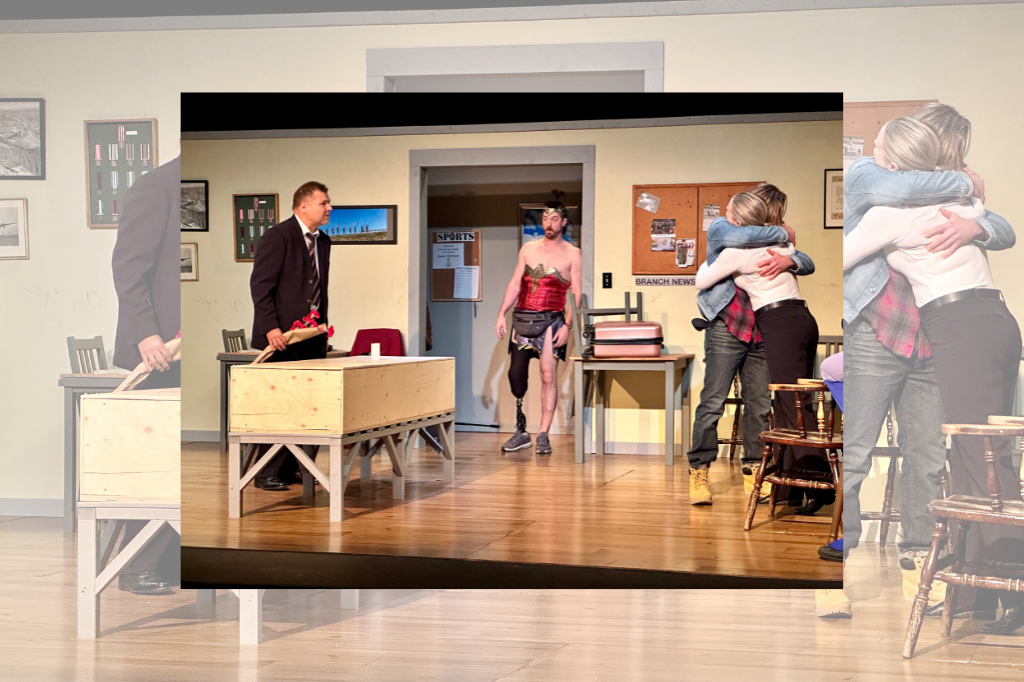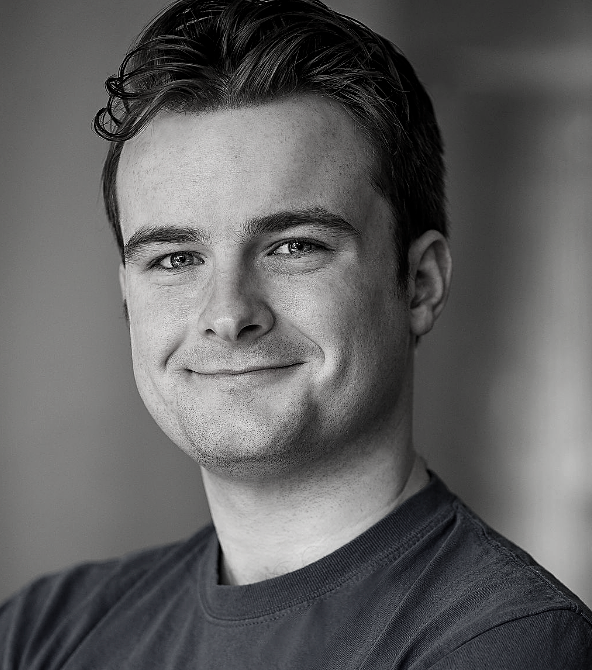REVIEW: Tunnel at the End of the Light at Alumnae Theatre/Roland Gossage Foundation/Soldiers in the Arts
Content warning: this review contains mention of suicide.
Tunnel at the End of the Light is difficult to categorize. It’s not a professional show, exactly: it’s part of Soldiers in the Arts, a Roland Gossage Foundation program offering veterans the opportunity to engage with theatre; half of the eight-person cast served in Afghanistan; and there’s even a service dog in the show.
And yet it’s not not a professional show, either: it’s an Equity production, the other half of the cast are professional civilian actors, and they’ve invited critics.
This tension is no cause for concern, however: it’s what makes the show unique. It’s a project that exists outside of Canadian theatre’s usual production frameworks, and that’s an immensely beautiful thing.
The play, written and directed by Jonathan Guy Lewis, concerns the apparent suicide of Canadian veteran Eric “Top Gun” McCracken, who served in Afghanistan. Presumably because it’s a suicide, Eric doesn’t receive a formal military funeral. Instead, the rest of Eric’s former platoon get together for the first time in 12 years to honour his life by cracking a few beers at a Toronto branch of the Royal Canadian Legion. They grieve Eric, and grapple with the implications of the military’s recent withdrawal from Afghanistan. And Eric’s adult daughter, Joni (Alexandra Floras-Matic), makes a surprise appearance.
Tunnel at the End of the Light is an ensemble piece through and through. For me to detail the backstory of all seven veteran characters would be beside the point, as the show is far more about the collective: collective grief, collective joy, collective trauma, collective memory. And once the whole ensemble is together onstage, the show works very well. Though I wouldn’t say the civilian actors (M. John Kennedy, Tony White, Reece Presley, and Floras-Matic) are indistinguishable from the veteran actors (Cassidy Little, Andrea Greening, Will Matheson, and Ryan Hawkyard), the difference isn’t jarring, either. Plus, when the cast joins together for moments of song, choral speech, or synchronized movement, the friction of the two groups’ different performance backgrounds produces a strangely compelling dramaturgical texture.
The show’s most thrilling scene is a match of the drinking game Beer Hunter, which is essentially beer can roulette: two players pick a beer can from a set of cans, one of which has been vigorously shaken; the players then open the beers in front of their faces, and whoever gets exploded on is eliminated. Though the results are likely pre-planned, the ensemble injects the game with liveness: their reactions are completely in-the-moment, and the carbonated beer cans’ torrential spray is excitingly volatile. The other key to the scene’s success is its duration: there are at least five rounds of the game, and they aren’t at all rushed through. It gets the full time it needs to feel real. And since it channels the unpredictable danger of roulette, it’s also weightfully symbolic of the platoon’s ability to make the most of a life-or-death scenario. This all combines to produce the most divinely exultant few minutes of theatre I’ve seen in a long while.
Thematically, the show is complex. Joni arrives at the Legion not to grieve her father but to pick up a letter he left her. When the platoon asks her to stay and celebrate, she at first resists, revealing that he was abusive towards her and her mother. The platoon responds by defending his actions on account of his PTSD, but the show doesn’t ultimately absolve him from guilt. It presents both Eric and Joni’s trauma as real, with neither cancelling the other out. Similarly, hotheaded veteran Aaron “Fitz” Fitzgerald (Little) goes on a few politically incorrect tangents involving, among other things, transphobia. When Joni calls him out on his language, the platoon explains that this anger stems from his time in the war. His language isn’t presented as entirely acceptable, but it doesn’t seem unforgivable either. And there’s another layer to Aaron: while he uses discriminatory language, he takes offence when others mock his amputated leg. The show’s ability to find fresh angles on these issues is refreshing, and may well be thanks to the veteran actors’ real-life experiences.
Marysia Bucholc’s set, grounded in realism, is detailed — though I didn’t know what a Legion branch was before the show, community bulletins, a Canadian flag, and a makeshift wooden bar make the cozy community centre vibe clear, and a moonlit, snow-lined window establishes temporal setting. Eric left a note requesting the platoon dress up like superheroes for his funeral, and costume designer Fiona Cradock has some of the veterans follow suit; the lightheartedness of these outfits ensures the mood never gets too dark. Mary Jane Boon’s lighting design and John Corcelli’s sound design are only overtly theatrical at the beginning and end of the show, when they spotlight Eric’s wooden coffin to processional music. The rigour of keeping the rest of the show entirely realistic is admirable, if not always rousing.
Since it’s confined to one room, the play’s toughest obstacle to overcome is staticity. And the first half of its 100 minute run time, in which the platoon arrives one by one, often struggles in this area — it quickly becomes obvious we are merely waiting for everyone to be introduced. Furthermore, the chairs that line the perimeter of the room make it too easy for Lewis to fall back on having the actors sit, which endangers some of the show’s urgency. But the playfully rambunctious physicality of the show’s second half eventually makes this a non-issue; this is a show that only gets better as it goes on.
I fear Tunnel at the End of the Light will go underseen because it exists outside usual theatrical paradigms. This would be a shame: it is exhilaratingly playful, thematically complex, and has a clearly defined raison d’etre.
Tunnel at the End of the Light runs at Alumnae Theatre through May 21. Tickets are available here.
Intermission reviews are independent and unrelated to Intermission’s partnered content. Learn more about Intermission’s partnership model here.














Comments